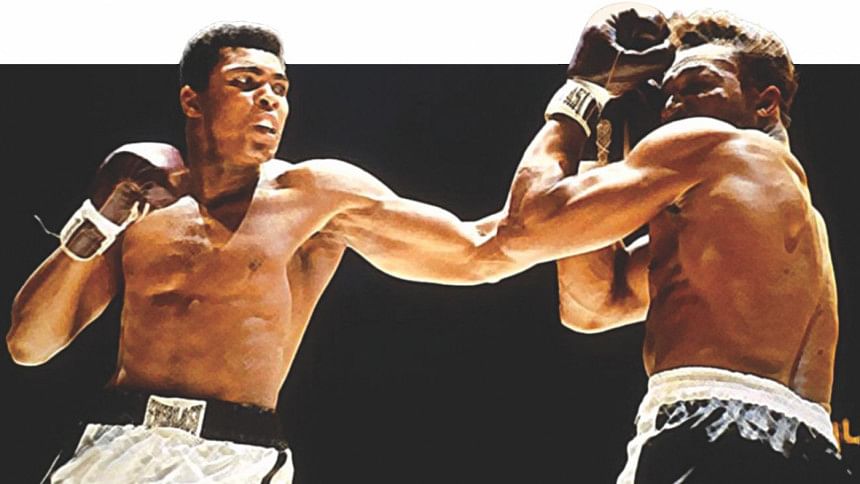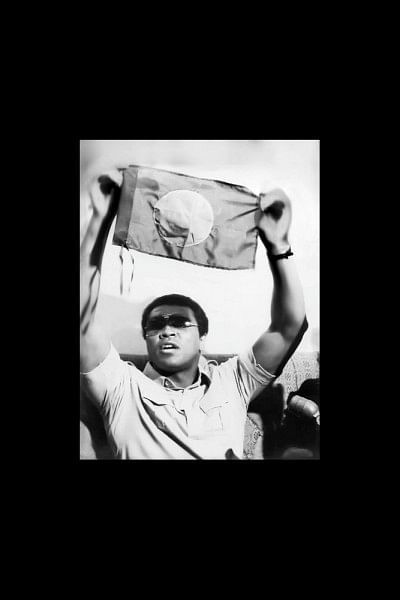MUHAMMAD ALI: A CITIZEN OF BANGLADESH


I had the good fortune of participating in a 1999 BBC poll that asked people in the UK: who is the most influential sport personality of the 20th Century? If you guessed the winner was Muhammad Ali by a few light years, then you guessed right. This tells a lot about the legacy Muhammad Ali left when he left for a journey to the unknown on Friday, Jun 3, 2016.
In 1954, when he was twelve, Cassius Clay, as he was then known, got a beautiful red and white cycle as a present from his parents. At the Columbia Auditorium, Louisville, Kentucky, Cassius lost the cycle. He found a police officer, Sergeant Joe Martin. He told Joe, he's going to 'whup' whoever stole his cycle. Joe trained young kids in boxing. He invited Cassius to learn how to box before he tried to take on the thief. The fate was written in the stars that day. Young Cassius went on to win the Olympic Gold medal in the Light Heavyweight category in 1960. After that, there was no turning back inside and outside the ring for Cassius, who would become Muhammad Ali, the most influential sport personality the world has ever seen.
My memories of Muhammad Ali are from the mid 1970s as a child living in Wales, UK. Muhammad Ali versus George Foreman, 1974, in 'The Rumble in the Jungle' in what was then Zaire in Africa significantly impacted me when BBC flashed footage of Ali running around in Zaire with the locals. The next year it was the 'Thrilla in Manila' against Joe Frazier. These two fights accompanied by the Michael Parkinson and David Frost interviews from BBC implanted a vision of a true champion.
I clearly remember the tension between the first and the second fights against Leon Spinks in 1978. My friends and I at school were so happy Ali defeated Spinks in the second fight. What I didn't know at the time, Ali made a visit in between the two fights. It was not to Africa or East Asia. It was to a newly born country, Bangladesh.
My family and I returned back to Bangladesh on February 1979. I learned from my cousins that Ali had visited Bangladesh on February, 1978 soon after the first Spinks fight where he had lost. Had to wait for footage of that visit on YouTube for years. Nevertheless, three things touched my heart then. BTV would flash the fight between Ali and a young Mohammad Giasuddin who was the same age when Ali started to fight, 12. In one of the three rounds, Ali patted Gias on his bottom. The referee intervened. By the end of the third round, Ali met the same fate, Sonny Liston did in 1964. Ali was knocked out. It was fitting that the boxing stadium at Paltan was named the Muhammad Ali Boxing Stadium. However, the memory of Ali in Bangladesh that left a lasting imprint was that Ali was given Honorary Citizenship to Bangladesh. This meant Ali was a Bangladeshi like all of us. The people of Bangladesh could be a part of whatever Ali did and whatever Ali stood for.
A champion is a person who excels in their field. That's the statistical achievement. When the champion influences people outside their field, they become an icon. An icon is a person who gives hope to people that every individual, if they want and if they work hard, can achieve their goals against all odds. By doing so, the icon unites mankind to a common goal of love. This is what Muhammad Ali did. This is what made him the most recognizable personality during his life time.
Wherever you are Champ, RIP. Bangladesh and the world salutes you for living a life that was meant for giving happiness, joy and hope to all who came near you and your persona.
Asrar Chowdhury teaches economic theory and game theory in the classroom. Outside he listens to music and BBC Radio; follows Test Cricket; and plays the flute. He can be reached at: [email protected]

 For all latest news, follow The Daily Star's Google News channel.
For all latest news, follow The Daily Star's Google News channel. 



Comments